Do you know that there are over 570 million blogs on the Internet today, and every time you blink your eyes, around 10 blog posts are published around the world!
What is Blogging? How Does Blogging work? Can you make money from Blogging?
In this article I’ll explain blogging A-Z.

Blogging has gained a lot of traction in the past few years.
But I still find a majority of people having wrong conceptions about it! Are you one among them, too?
To help clear all your doubts, I’m here with a detailed article on What is Blogging. Today, I am going to explain Blogging A to Z – what it is, how it works, its different types and features, how to set up a blog, and how to make money out of it!
P.S. I am also going to share some Pro tips that would be highly beneficial to you if you’re a beginner blogger!
Let’s get into our article right away!
What is a Blog?
Hmm, let me tell you a secret. What you’re reading on your screen right now, this is a blog! Simply, a blog is an online diary or journal that is located on a website.
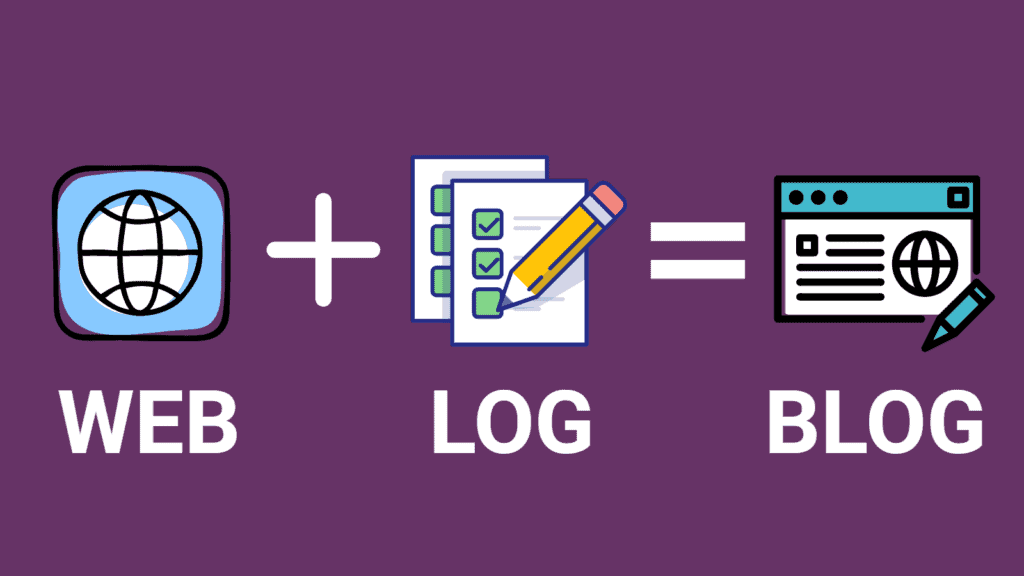
The word ‘blog’ comprises the words Web+log, meaning a series of content entries on a website. People creating blogs are called ‘Bloggers’. They post about their lives, hobbies and interests on a blog.
A blog has several defining characteristics. Let’s find out what they are.
- The latest posts on a blog appear at the top, i.e., a blog is arranged in reverse chronological order.
- Content is regularly updated on blog. The frequency of posts is very high.
- The content of a blog revolves around a specific industry/category.
- The viewers can interact with the blogger through the comments section. It’s more interactive.
So, you can say that a blog is simply a frequently updated website!
How Does a Blog Work?
A blog runs on a blogging platform. You can also create a blog through coding. But, most of the bloggers out there lack the technical skills to design their own blogs. Therefore, CMS has jumped into the field to help!
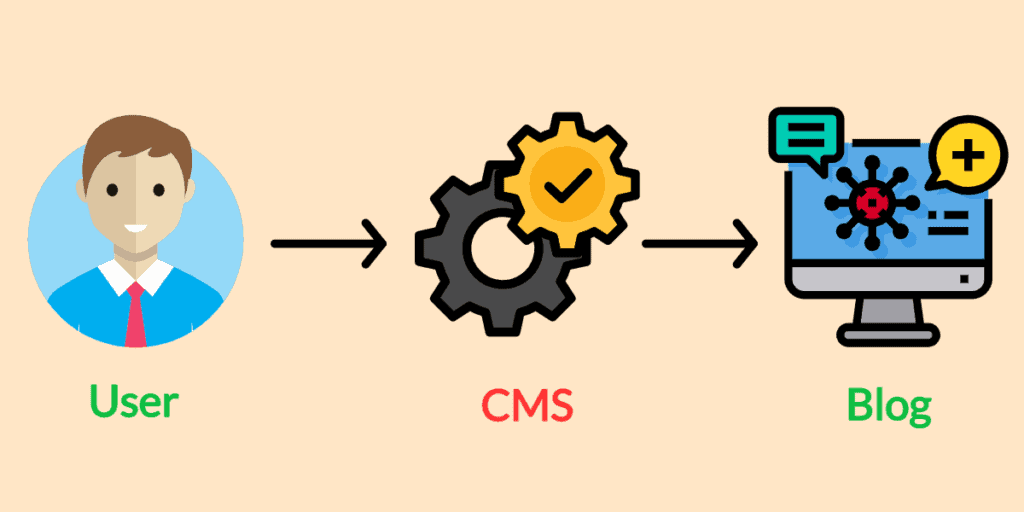
CMS (content management system) is a readymade software platform that helps bloggers create, publish, design, manage, and change the content on their blogs requiring no technical knowledge or skills.
The most popular CMS include WordPress.com, WordPress.org Blogger, Tumblr, Medium, Drupal, and Joomla.
To know what is the difference between WordPress.com and WordPress.org, check out this video!
Difference Between a Blog and a Website
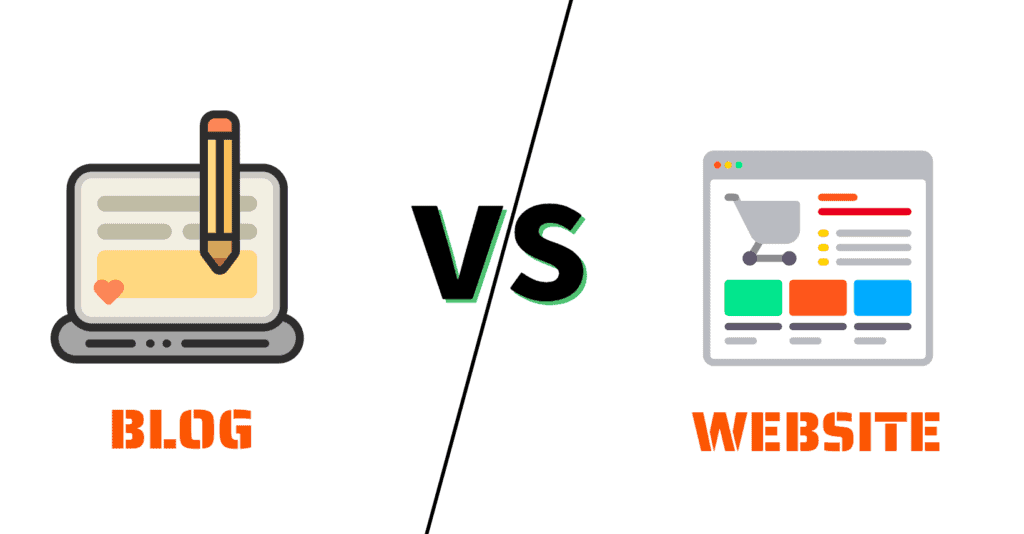
There are major differences between a blog and a website. But the most significant one is this –
- All blogs are websites, but not all websites are blogs.
Yes, a blog can be a section (sub-domain) of your website or exists independently.
If you’ve noticed, the websites of reputed companies or brands always have a ‘Blog’ column on their home page. For example, this is the homepage of WordPress.com. If you scroll to the bottom, you will find a link to their Blog section.
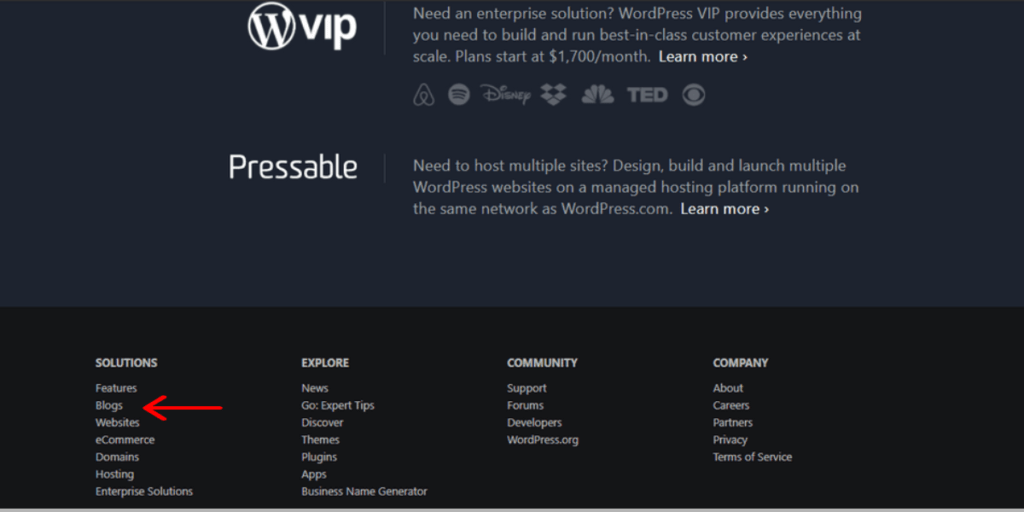
Do you know of any other websites that feature a blog section? Shoot them in the comments below.
- Blogs are frequently updated.
A blog is more dynamic, while websites are mostly static. New content is added on blogs regularly, and some bloggers even publish multiple posts in a day!
- Websites display information; Blogs display a variety of content.
Websites are more inclined towards providing information about their products/services. They use web pages to create a structure and layout to display information effectively.
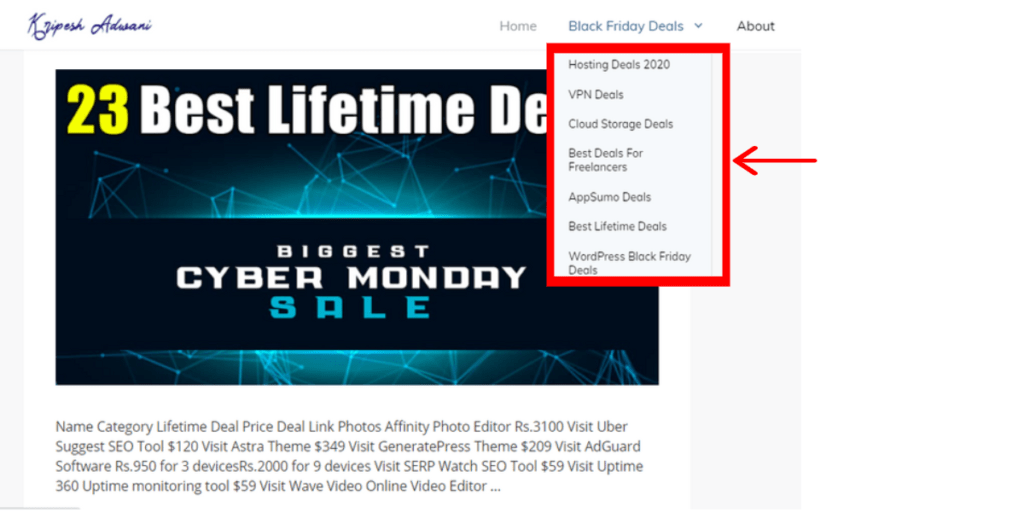
While blogs can comprise a wide variety of content. Bloggers make use of different categories and tags to organize their content properly.
- Blogs promote discussions
Blogs comprise a comments section to promote interaction among the readers and build an online community.
A website is more formal. It is more focused towards communicating its content, product, or service. You won’t find a comments section, but you can send them mails or contact their customer support.
Can Anyone Start a Blog?
Yes, literally my old grandpa or my 5-year-old nephew can do that! You don’t need to know a single piece of code to blog.
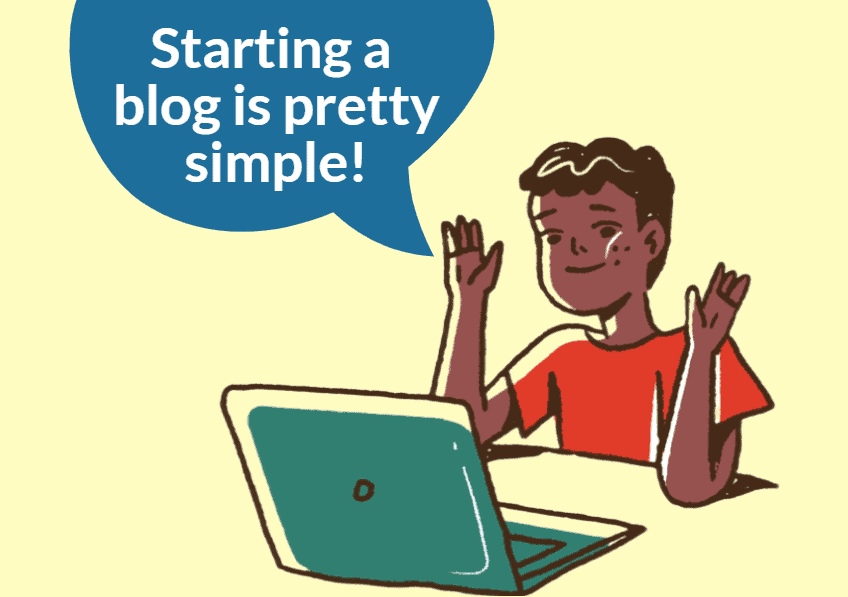
A few clicks and you are ready to go! In fact, setting up a blog on WordPress is quicker than making those 2 minute noodles! 🙂
Also, you don’t need to be an expert in a particular field to start blogging. You don’t need to have a PhD in Marketing to talk about marketing techniques.
Even if you are a student, you can still start a blog and talk about your knowledge and experience in the field. Having an interest in your topic matters the most!
What Do You Need to Set Up Your Own Blog?
If you are a beginner and have no idea where to start, I suggest you sign up for a free plan on WordPress.
With WordPress, all you need to care about is your content. And the WordPress team handles the rest.
But, if you need to start some serious blogging business, then you will require:
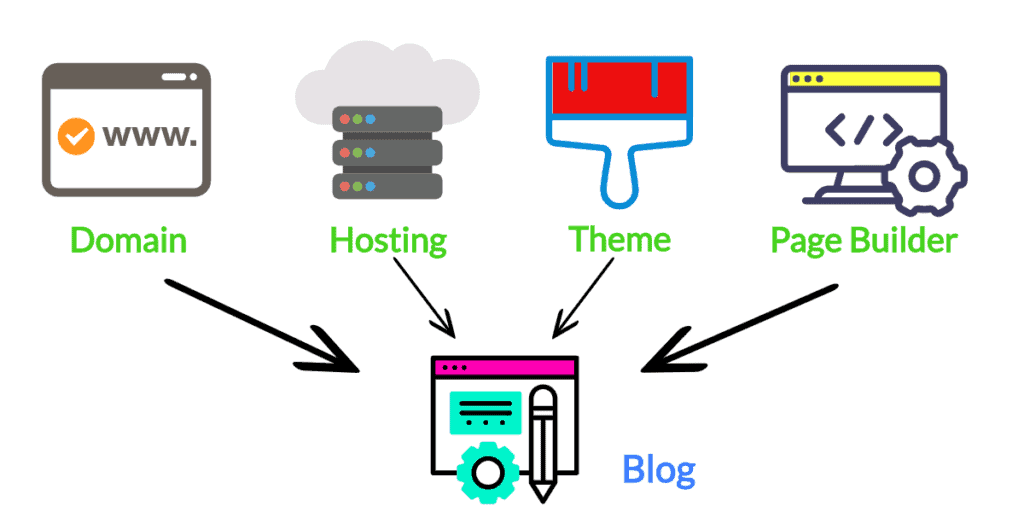
- Domain
Domain name refers to the name of your website. If you want to get the best and most affordable domain names in India, do check out my video on Best Domain Registrars in India 2020.
- Web Hosting Service
A hosting service provides you storage space for your website, and also provides tools for your site’s maintenance, security, updates, backups, etc. The minimum cost of a hosting service is around Rs. 5000 a year. Want to know what are the best hosting companies in India? Take a look at this – Best Hosting in India (2020).
- Theme
To make your blog appear attractive, you will need a lightweight and fast theme that supports different widgets and customizations. I prefer GeneratePress and Astra themes for my blogs.
- Page Builder
A page builder is a plugin that helps you design professional looking pages with superior design effortlessly!
Some examples of popular page builders might be Elementor builder, Beaver builder, Divi builder, Thrive Architect, etc.
To know more about domain and hosting, check out this article first!
Check What is Domain & Hosting? article.
What are the Benefits of Blogging?
So, should you start a blog too? Well, there are hundreds of reasons you definitely should! Let’s check out the major benefits of blogging:
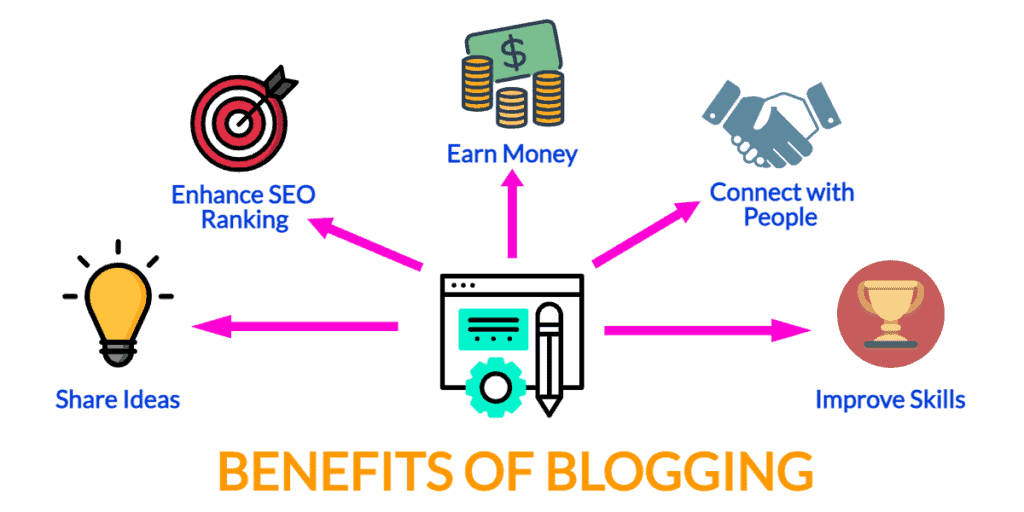
- Blogging provides you a space to share your ideas and information, and keep them all organised at a particular place.
- It helps people polish their writing and other skills and become an expert in their respective field.
- Blogging connects you with like-minded and creative people that share your interests.
- It helps to enhance the search ranking of a business or a website. Business websites use blogs to garner more traffic and leads.
- While Non-profit organizations use blogs to spread more awareness about their cause.
- Blogging helps you grow trustworthy followers that believe in your brand.
- You can also earn money by monetizing your blog and selling your products/services to people.
Basic Structure of a Blog
Blogs, today, are overloaded with widgets like image sliders, email subscriptions, testimonials, Instagram feeds, author profiles, etc.
But the standard structure of a blog remains the same. Your blog must comprise these elements:
Header
The header section of your blog has the Navigation Bar. It comprises links to the important pages, categories, or services on the blog.
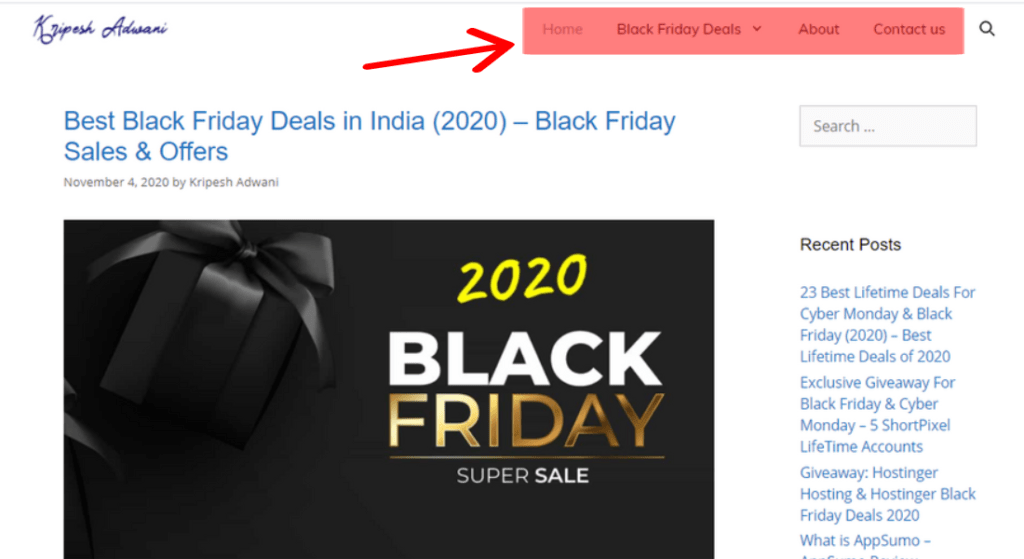
Content Area
This is the section where all your blog posts are displayed in a reverse chronological fashion. This means it will display the latest posts on the top.

Sidebar
A sidebar is a very useful section in a blog that appears on the left/right side of your main content.
It can display additional information like a list of your recent posts, comments, author’s profile and portfolio, calls to action like email subscription forms, etc.

Footer
Footer is the bottom section of your blog that is displayed below the main content.
It appears on all pages of a blog and comprises the legal information like copyright notices, privacy policy, disclaimer, contact pages, etc.
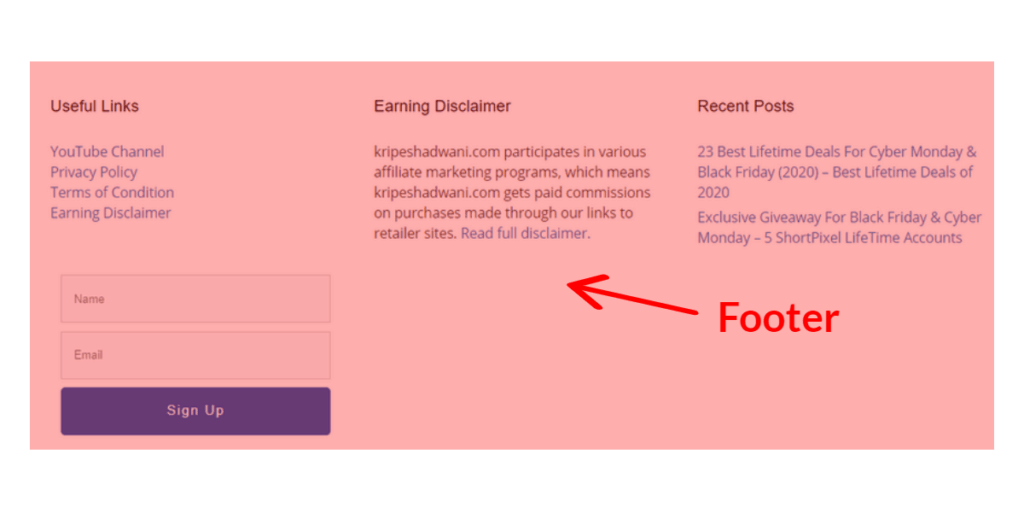
Types of Blogs
Wondering what topics you should blog about? Well, there are no restrictions on that.
While starting out with blogging, you can try out various categories like lifestyle, fashion, food, tech, music, DIY, sports, travel, politics, fitness, business, finance, parenting, news, and other topics of your interest.
However, today, blogging is more focused on the readers and every blogger is busy in the race of finding fresh ways to attract more readers!
But do you know the secret? The only sure-shot way of gathering a dedicated audience base is creating useful content.
There are content categories that have proved to be successful in the past years. If you are just starting out with your blog, do try your hand at these and figure out which works best for you.
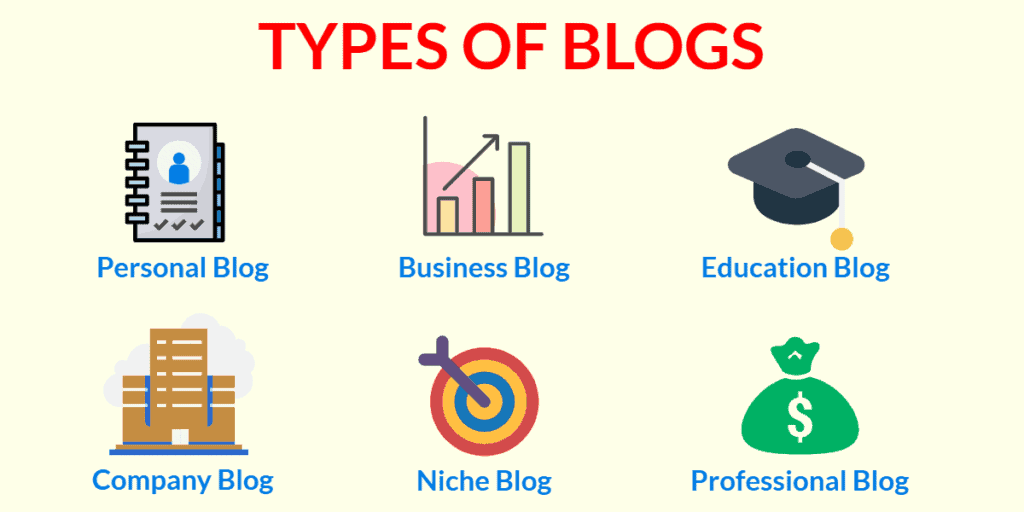
1) Personal Blogs
Personal blogs are all about the person who runs the blog. These types of blogs contain updates about the blogger’s life, daily events, and his/her opinions.
Personal blogs rarely aim at making money, but at finding and connecting with people of similar interests and beliefs.
2) Company Blogs
Company Blogs are written by companies to provide information about their own products and services. For example, Hostinger has a Company blog that is frequently updated with informative topics like what is hosting, how to use it, what is WordPress, etc.
3) Business Blogs
Business Blogs involve a business mindset. They create content targeted at a specific area/topic to attract viewers that can become their potential clients.
These blogs make money by offering their products and services to people.
For example, I am a software developer who wants to earn money. What would I do? I’ll start a business blog and start blogging about wide aspects of programming, computer technology, softwares, etc.
This will help me gather a loyal reader base, to whom I can sell my software and services afterwards.
Business blogging helps you build your expertise in a particular field and also showcases your skills to your potential clients. So, if you wish to sell consultancy services, software, etc, you can go for a Business blog.
A good example of a Business Blog is Neil Patel. He does not monetize his blogs directly. His main revenue comes through consultancy services and selling his own software.
4) Professional Blogs
Professional Blogs solely aim towards earning money. A Professional blogger’s income totally depends on his/her blog and he implements lots of monetization techniques on his content like displaying ads, promoting other people’s products/services to earn a commission out of it, etc.
Professional bloggers either focus on creating content for one website or lots of niche websites. Their principal goal is to generate huge traffic that would benefit them with their advertising and sales.
An example of a successful Professional Blog would be ShoutMeLoud. You’ll find lots of how-to guides on Blogging and WordPress on their website. Their main purpose is revenue generation and their major source of revenue is affiliate marketing!
5) Education blogs (EduBlogs)
Educational Blogs are created for educational purposes and are an online resource to provide information to students or learners. These types of blogs contain informative texts, course content, online courses, etc.
6) Niche Blogs
Niche refers to a small section of a larger area. A Niche Blog focuses on a specific topic that the blogger specializes in and is directed towards a specific audience.
Not everyone is interested in finding out ways to pet a cat, right? That’s a very niche category! This means it caters to the interests of a very specific group of people.
A food blogger extensively creating content on healthy breakfasts is a niche blogger.
A tech blogger extensively creating content on domain, hosting, and VPNs is a niche blogger. (Yes, that’s me!)
Niche blogging is one of the most efficient ways to grow a dedicated audience in less time!
How to Earn Money From Your Blog?
There are multiple ways to start earning from your blog. Some of the most popular ways are:
- Displaying ads on your blog
- Selling online courses
- Through affiliate marketing
- Offering consultancy services
- Selling your products or software
- Through sponsored posts
Your method of monetization would depend on your chosen niche.
Blogging Tips for Beginners
1. Be careful while choosing a blogging platform
A very common mistake beginners make while starting out with blogging is selecting the wrong blogging platform! I recommend you to use WordPress. It’s super popular and is powering over 37% of the websites on the Internet today!
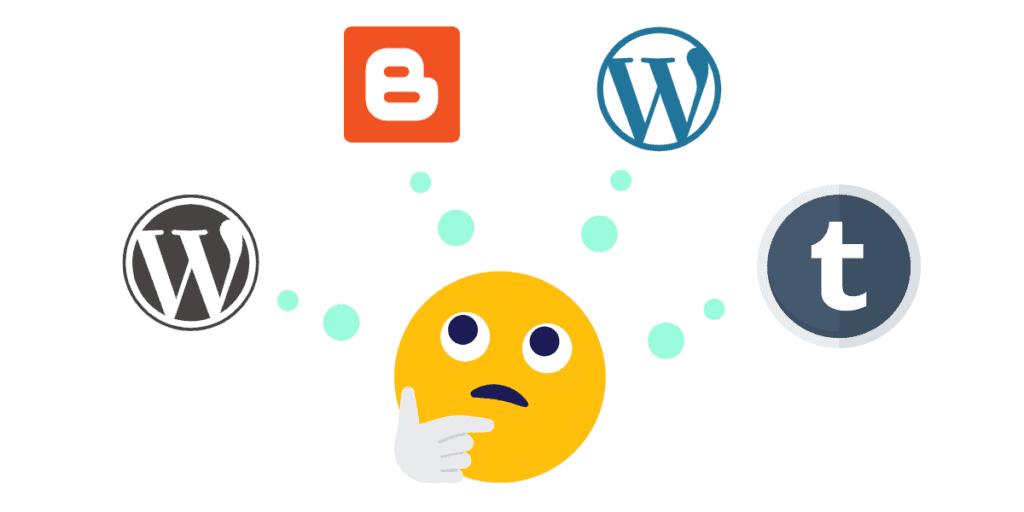
But wait! There’s still more. You might come across two different WordPress – WordPress.com and WordPress.org. Which one should you choose?
If you’re just beginning, you can go with the free version of WordPress. But if you’re a bit experienced and have your own business, established brand or company, then you can go for premium plan or WordPress.org.
To know more about the differences between WordPress.com and WordPress.org, and which one is best for your needs, you can check out this detailed video!
2. Choose your target audience
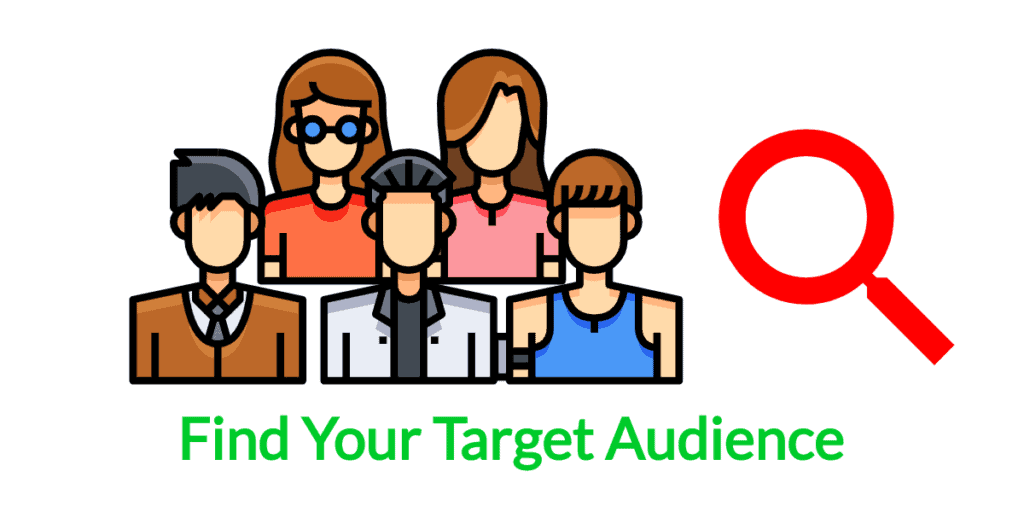
When starting your blog, you should always have a target audience in mind. For example, if you start a fashion blog, your target audience is teenagers and young ladies. If you start an educational blog, your target audience would be school and college students.
3. Post valuable content.

Now, you have a blogging platform, and you have your audience group. The next step is to brainstorm some good content ideas that would attract your targeted readers to your blog.
Start writing extensively on your specific domain, and your blog will certainly gather dedicated followers.
4.Post frequently
The most important step now is to remain active on your blog and post useful content regularly. Create a strategy for your blog posts and decide on the theme, topic, timing and frequency of your posts every week.
5. Optimize your blog
Finally, after following all these steps, you will start receiving more readers on your blog. What to do next? You need to ensure that their experience while surfing your website is satisfactory.
To make that possible, you can make use of plugins to optimize your blog for a better site speed, design and user experience. You can also learn about SEO and blog promotion techniques to enhance your reader base.
I hope this article helped you understand the basics of what a blog is all about and how you can start one today! If you liked this article and are interested in reading more such informative content, then do subscribe to my Newsletter!
I will ensure that you keep receiving valuable content regularly. Thanks for reading! This is Kripesh signing off! I’ll see you guys in the next post. Keep shining! 🙂
FAQ
How do you start a blog for free?
You can easily start a free blog in less that 5 minutes by signing up on blogging websites like WordPress, Blogger, Medium, Tumblr, Wix, etc.
All you need to do is sign up with your email, choose a cool blog name, select a theme from the templates and you’re all set!
How much money can you make from blogging?
There’s no fixed number for this. People have earned millions from Blogging. In India, a Blogger can earn anywhere around $100 to $30,000 a month, though there’s no guarantee!
The field of Blogging in India is gaining popularity very fast, which is why you should definitely try it right now!
WordPress vs Blogger – which is better?
WordPress is the best and most trusted blogging platform ever. It is powering more than a third of the websites on the Internet right now!
It is also loaded with thousands of handy features to make your blogging experience a super delightful one!
To know more, check out my video on Blogger vs WordPress.
What is the difference between Blog Posts and Pages?
Blog posts are displayed in a reverse order of chronology on your Blog. They have a publish date, category, certain tags, features images, a comments section and more.
Website Pages are used to display static content that doesn’t require any frequent updations. About Us, Team, Contact Us, Privacy Policy, Services, etc are all examples of website pages.
What are the most effective ways to promote blogs?
You can promote your blogs by:
1. Sharing them on various social media platforms
2. Writing guest posts on famous blogs
3. Networking with people having similar interests
4. Actively answering questions on Quora.
5. Reaching out to popular influencers
What are some popular blog topics?
Some popular topics to blog about can be Lifestyle, Music, DIY, Sports, Travel, Politics, Finance, Fashion, Food, Tech Parenting, News, Fitness, Business, etc.
What is the difference between a Blog and a Portfolio?
A Portfolio showcases your creative skills to your potential clients. It does not promote any interaction or engagement.
While, a blog is a collection of your personal ideas, or content created on specific categories. Blogs also consist of a comments section to promote interaction among people.
If you are a content writer, your blog can be your portfolio as well!
What is the difference between Social Networking and Blogging?
Blogging and Social Networking both allow sharing of your ideas will a large number of people. They only differ in their main motive.
Social Networking is all about connecting with people, while Blogging is about creating content that gives rise to healthy interactions!
What is the difference between Blog and Vlog?
A blog and a vlog only differ in their presentation of content. A blog presents ideas in a written format, while a vlog presents ideas in a video format.
Vlog is a combination of the words video+blog.
What skills do you need to have for Blogging?
1. Basic technical knowledge to set up WordPress, tweak the themes, plugins, speed, etc.
2. An interest in content writing.
3. Basic knowledge of SEO to figure out what topics are in demand.
4. Niche Selection


very informative and unique site
This blog post, “What is Blogging & How Does It Work? Blogging Explained,” is a valuable resource for anyone seeking to understand the world of blogging. It offers a clear and concise explanation of what blogging is and how it operates. The insights on the diverse purposes of blogging and the practical advice for beginners make this post a must-read for aspiring bloggers. Well done!
This was informative- and inspired to start one some time.
Glad you liked it.